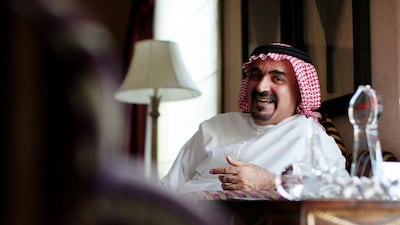Back in 2009, Nakheel was the barometer of the Dubai economy, and the pressure was falling fast.
As the company responsible for some of the emirate’s most jaw-dropping properties, most notably the Jumeirah Palm and The World archipelago, Nakheel had done a good deal to create Dubai’s global image.
Nakheel executives do not like the word bling, but that was the image often associated with the company, and with the emirate, and Nakheel was the bling merchant par excellence.
But at the height of the financial crisis, there was little glamorous in what was happening at Nakheel. The develper was responsible for the lion’s share of debts owned by Dubai World, which threatened the health of the Dubai financial system.
About US$16 billion of Nakheel liabilities had to be restructured with creditors, contractors and customers. Projects were mothballed. Lawsuits were flying.
The man brought in to handle the crisis was Ali Rashid Lootah. Direct, plain talking and with a reputation for discipline, Mr Lootah dragged Nakheel back from the financial precipice.
Now, with the outlook seemingly set fair in property development, Mr Lootah is talking freely, even proudly of the changes Nakheel has experienced since he got the top job nearly four years ago.
“Financially we’re doing much better, in the sense that we are ahead of the restructuring plan and the progress anticipated in that plan,” he says.
“We’re shooting for 20 per cent profit growth every year, and we’re on target to achieve that. The message is that we’re a developer that is here to stay, and that means growth,” he adds.
On the basis of financial figures for the first nine months of this year, Mr Lootah’s target figure looks distinctly conservative.
Profits leapt 58 per cent to Dh1.77 billion on the back of a 50 per cent rise in revenue to Dh6.83bn. More than 2,000 properties were handed over, and the company is on track to complete 3,000 by the end of the year, Mr Lootah says.
“We’re almost done with the legacy projects, and that means new projects are being planned and are being handed over, with the focus on retail, hospitality and residential developments,” he adds.
“By next June, we’ll have delivered Palma Residences on the Palm Jumeirah. That was the first new project announced since the crisis, and we were the first company to launch a new project then. So it’s pleasing to see new projects being handed over,” he says.
There is a trace of legacy in many of the big things Nakheel is planning over the years to come. There are malls and hotels on the Palm Jumeirah, whole islands on The World, and lots of work on Deira Island, the development that grew out of abandoned plans for another palm further up the Dubai coast.
“Deira Island is in accordance with the vision of Dubai that encourages tourism, especially in that heavily populated part of the emirate where some of the facilities are ageing. It will bring new hotels and a night-market souq concept to the area.
“On The World, we’ve sold 70 per cent of the islands and are encouraging people to start development by giving them breaks and payment plans to kick-start things. There are serious people coming forward and we’ve collected their cheques, so it’s real,” he says.
Mr Lootah denies that there is any plan to connect The World to the mainlaind through a causeway.
The biggest and most ambitious of the legacy projects, the Jebel Ali palm, remains a long-term development. “Perhaps in 10 years, maybe earlier, we will see how the market moves, and that’s basically down to supply and demand. There is still lots of infrastructure to be built at Jebel Ali, and that’s much more expensive than reclamation,” he says.
The injection of confidence from Dubai’s success in winning the Expo 2020 will be an important boost for the whole market, he says. “Expo is a very good thing, and we’re right there with Al Furjan project.
“There was serious interest throughout the Expo decision process, and we sold 500 plots a couple of days before the decision. Al Furjan is already semi-served with infrastructure, it’s well advanced, so we have to capitalise on that,” he says.
Is there a long-term demand for property in Dubai? “All major developers are very cautious on this. I don’t think they’ll rush into a big project until they see there is the right level of demand. It’s very different now than the pre-crisis days. Customers, developers and lenders are all very cautious. So for that reason I don’t think the bubble conditions will return,” he says.
“There is a different type of buyer now, mostly cash, with very few mortgaged sales. We still ask for post-dated cheques. Buyers are regional and international, across the board really – Europeans, Indians, Iranians, local and regional, and also Russians and Chinese.”
The recovery in Dubai’s property market, and Nakheel’s success in meeting the new demand, have given Mr Lootah a new flexibility in dealing with creditors. “Now the banks are taking us more seriously,” he says.
fkane@thenational.ae

